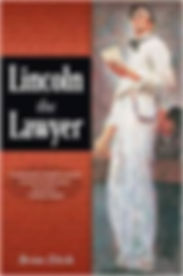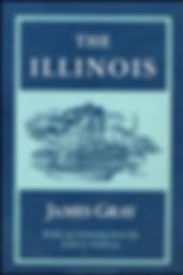Corn Kings and One-Horse Thieves
Odds & ends

Illinois past and present, as seen by James Krohe Jr.
The Corn Latitudes
Boundaries
Race and friendship in 1960s Springfield
Illinois Times
August 26, 1977
A small excursion into the state of race relations in the capital city, disguised as a memoir. Some time ago I had the idea to write about this episode of my life, and I was surprised to learn, going through my files, that I already had, in 1977.
Two sentences were out of place in the original; I here put them where they belong.
When I was a boy, my family lived on Springfield's East Side. Not on the poor East Side, mind you, but in a new suburban nest south of Cook just off 25th built by Barker-Lubin for the comfort of the returning World War II vets. The houses were small—bungalows really—but they were new and they were cheap. The people who lived in them, my parents' friends, the parents of my friends, all were white. It was something I didn't notice at the time.
Everything I learned and didn't learn about race I learned from my father. He was and is a musician. He's been a professional since before he was old enough to drive a car. He grew up in a small Illinois river town in which black people were as alien as Laplanders and were detested all the more for the whites' ignorance of them. But in the society of musicians in which my father traveled, black men were neither alien nor detested; indeed, because of their ability, they enjoyed a status among fellow musicians, white and black, that was denied them by the outside world. Being black (or white) meant nothing; it was how a cat played that mattered. That's what my father taught me. He was not oblivious to race. He just didn't think it mattered.
While I was growing up, then, the issue of race rarely took any recognizable shape. I was taught early not to say ''nigger,'' that it was a bad word, an ugly word. It was a nicety few of the people in my neighborhood—parent or child—bothered to observe, but I attributed its use to bad manners, nothing more. I was once encouraged to invite a black friend home from junior high school one day to play basketball; it was not until later that I realized that he was the only black person that street had seen in maybe eight years and that I, as the agent of his appearance, was responsible for some transgression. Within my house, however, the event passed unnoticed.
I had gone to grade school at Matheny, six blocks away. Most of the kids I went to school with were white. There were black kids in our neighborhood, but they went to school at Withrow, across the tracks. The B&O railroad tracks formed the dividing line between the black neighborhood and the white, which in our neighborhood also meant the line between the poor and the (barely) middle class. It was a line we kids crossed at will but our parents never did. Because I couldn't see it, it was years later before I realized it was there. Withrow was closer to our house than Matheny was, but we went to Matheny. The school boundary had been drawn along the tracks.
Later on, in junior high school, there were many black kids. One of them—he lived on the other side of the tracks and had gone to Withrow, which is why I'd never met him—became my best friend. His name was Keith and his father was the staff artist for the Copley Press. When it was time for high school, my family moved across town and I had to go to Springfield High School. One of my old junior high teachers—an imperious, red-headed English teacher—also transferred to SHS, although in her case the move was voluntary. (Keith had by this time moved to California with his folks.) One day during my junior year, this teacher, remembering our junior high days, complimented me for having then had the courage to have a black boy—I think she used the word "colored"—as a friend.
The remark confused and angered me. Keith was better looking than I was, a tastier dresser, handier with the ladies, a better basketball player. I did better only in class—in my view, not much of an achievement. It had taken no courage to call Keith my friend; indeed, I was always a little puzzled that he, with his plainly superior gifts, had condescended to be mine. I had been blithely unaware until that moment that courage was called for. The fact of his color had not mattered to me and I assumed, stupidly, that it mattered to no one else either. Had 1 been more aware, had I known as I came to know later that many people of my home town found much to censure in such associations, I might have sought out other, safer friends. What my teacher mistook for courage was naiveté.
But the episode taught me a lot more about other people than it taught me about myself. I learned about race on the East Side. I had to move to the West Side to learn about racism. ●
SITES
OF
INTEREST
Essential for anyone interested in Illinois history and literature. Hallwas deservedly won the 2018 Lifetime Achievement Award from the Illinois State Historical Society.
One of Illinois’s best, and least-known, writers of his generation. Take note in particular of The Distancers and Road to Nowhere.
See Home Page/Learn/
Resources for a marvelous building database, architecture dictionary, even a city planning graphic novel. Handsome, useful—every Illinois culture website should be so good.
The online version of The Encyclopedia of Chicago. Crammed with thousands of topic entries, biographical sketches, maps and images, it is a reference work unmatched in Illinois.
The Illinois chapter of the American Institute of Architects in 2018 selected 200 Great Places in Illinois that illustrate our shared architectural culture across the entire period of human settlement in Illinois.
A nationally accredited, award-winning project of the McLean County Historical Society whose holdings include more than 20,000 objects, more than 15,000 books on local history and genealogy, and boxes and boxes of historical papers and images.
Mr. Lincoln, Route 66, and Other Highlights of Lincoln, Illinois
Every Illinois town ought to have a chronicler like D. Leigh Henson, Ph.D. Not only Lincoln and the Mother road—the author’s curiosity ranges from cattle baron John Dean Gillett to novelist William Maxwell. An Illinois State Historical Society "Best Web Site of the Year."
Created in 2000, the IDA is a repository for the digital collections of the Illinois State Library and other Illinois libraries and cultural institutions. The holdings include photographs, slides, and glass negatives, oral histories, newspapers, maps, and documents from manuscripts and letters to postcards, posters, and videos.
The people's museum is a treasure house of science and the arts. A research institution of national reputation, the museum maintains four facilities across the state. Their collections in anthropology, fine and decorative arts, botany, zoology, geology, and history are described here. A few museum publications can be obtained here.
“Chronicling Illinois” showcases some of the collections—mostly some 6,000 photographs—from the Illinois history holdings of the Abraham Lincoln Presidential Library.
I will leave it to the authors of this interesting site to describe it. "Chicagology is a study of Chicago history with a focus on the period prior to the Second World War. The purpose of the site is to document common and not so common stories about the City of Chicago as they are discovered."
Illinois Labor History Society
The Illinois Labor History Society seeks to encourage the preservation and study of labor history materials of the Illinois region, and to arouse public interest in the profound significance of the past to the present. Offers books reviews, podcasts, research guides, and the like.
Illinois Migration History 1850-2017
The University of Washington’s America’s Great Migrations Project has compiled migration histories (mostly from the published and unpublished work by UW Professor of History James Gregory) for several states, including Illinois. The site also includes maps and charts and essays about the Great Migration of African Americans to the north, in which Illinois figured importantly.
An interesting resource about the history of one of Illinois’s more interesting places, the Fox Valley of Kendall County. History on the Fox is the work of Roger Matile, an amateur historian of the best sort. Matile’s site is a couple of cuts above the typical buff’s blog. (An entry on the French attempt to cash in on the trade in bison pelts runs more than
2,000 words.)
BOOKS
OF INTEREST

Southern Illinois University Press 2017
A work of solid history, entertainingly told.
Michael Burlingame,
author of Abraham
Lincoln: A Life
One of the ten best books on Illinois history I have read in a decade.
Superior Achievement Award citation, ISHS Awards, 2018
A lively and engaging study . . . an enthralling narrative.
James Edstrom
The Annals of Iowa
A book that merits the attention of all Illinois historians
as well as local historians generally.
John Hoffman
Journal of Illinois HIstory
A model for the kind of detailed and honest history other states and regions could use.
Harold Henderson
Midwestern Microhistory
A fine example of a resurgence of Midwest historical scholarship.
Greg Hall
Journal of the Illinois
State Historical Society
Click here
to buy the book
Southern Illinois University Press
SIU Press is one of the four major university publishing houses in Illinois. Its catalog offers much of local interest, including biographies of Illinois political figures, the history (human and natural) and folklore of southern Illinois, the Civil War and Lincoln, and quality reprints in the Shawnee Classics series.
The U of I Press was founded in 1918. A search of the online catalog (Books/Browse by subject/Illinois) will reveal more than 150 Illinois titles, books on history mostly but also butteflies, nature , painting, poetry and fiction, and more. Of particular note are its Prairie State Books, quality new paperback editions of worthy titles about all parts of Illinois, augmented with scholarly introductions.
The U of C publishing operation is the oldest (1891) and largest university press in Illinois. Its reach is international, but it has not neglected its own neighborhood. Any good Illinois library will include dozens of titles about Chicago and Illinois from Fort Dearborn to
Vivian Maier.
Northern Illinois University Press
The newest (1965) and the smallest of the university presses with an interest in Illinois, Northern Illinois University Press gave us important titles such as the standard one-volume history of the state (Biles' Illinois:
A History of the Land and Its People) and contributions to the history of Chicago, Illinois transportation, and the Civil War. Now an imprint of Cornell University Press.




Reviews and significant mentions by James Krohe Jr. of more than 50 Illinois books, arranged in alphabetical order
by book title.
Run by the Illinois State Library, The Center promotes reading, writing and author programs meant to honor the state's rich literary heritage. An affiliate of the Library of Congress’s Center for the Book, the site offers award competitions, a directory of Illinois authors, literary landmarks, and reading programs.
